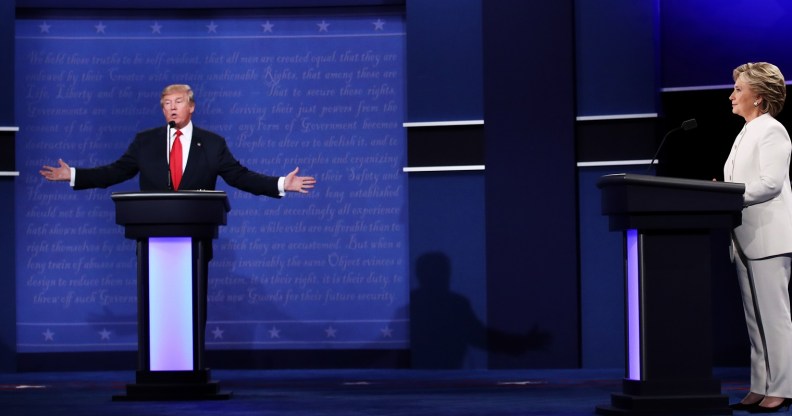Here is what Hillary Clinton and Donald Trump will actually do on LGBT rights

(Photo by Getty Images)
Ahead of next week’s election, PinkNews takes a look at the specific policy agenda set out by each Presidential ticket, and what it actually means for the LGBT community.
It’s easy to avoid specifics when it comes to this election, high on hyperbole but low on detail.
Below, we take a look at the policy plans laid out by the two main hopefuls, to help voters understand where they actually stand.
Donald Trump and Mike Pence
Mr Trump lists no policy document on LGBT issues, and the Trump campaign was unable to provide PinkNews with any specific LGBT policy details.
However, Mr Trump has laid out a number of public positions through announcements and public statements.
Firstly, and most significantly, Mr Trump has pledged to sign the Republican-backed First Amendment Defence Act, a law that would permit forms of anti-LGBT discrimination on the grounds of religion.
In a speech to Catholic interest groups, Mr Trump confirmed he would sign the law, which bans the government from taking any “action against a person on the basis that such person believes or acts in accordance with a religious belief or moral conviction that marriage is or should be recognised as the union of one man and one woman”.
The broadly-written law would part-legalise religious discrimination against LGBT people in all sectors, from employment to retail to healthcare, banning the government from intervening.
In passing FADA, Trump and Pence would be required to repeal Barack Obama’s 2014 executive order that extended LGBT anti-discrimination protections to federal contractors.
Mike Pence confirmed this intention, pledging to pare back President Obama’s orders on LGBT rights so that “the transgender bathroom issue can be resolved with common sense at the local level”.
Donald Trump’s plan for the Supreme Court also raises questions of an impact on LGBT rights. The next President is likely to be responsible for filling two or three seats on the highest court in the US, where most LGBT rights battles have been decided by a narrow 5-4 majority.
During the recent Presidential debate, Trump confirmed that he would appoint justices in the mould of the late Antonin Scalia, who opposed the decriminalisation of sodomy and penned a blistering dissent against the equal marriage ruling.
A public shortlist of Supreme Court candidates released by Mr Trump features only anti-LGBT conservatives, after the hopeful said he would “consider” using his appointments to overturn equal marriage.
If an anti-LGBT majority is built up on the Supreme Court, a harmful precedent on LGBT rights could be established for decades, not just for four years.
There are many issues that may end up before the court – from transgender rights, to anti-discrimination protections, to ramifications from the 2015 same-sex marriage ruling – which could be set back.
Mr Trump has affirmed his support for local state anti-transgender laws, though he does not have a declared national policy on the issue.
If Donald Trump releases an LGBT policy document, it will be added here.
Hillary Clinton and Tim Kaine
Hillary Clinton has vowed to continue progress made under Barack Obama and Joe Biden on LGBT rights, and has released a detailed policy document of proposals.
The Democratic candidate will veto the First Amendment Defence Act, and has pledged to sign the Equality Act – a bill that would amend the Civil Rights Act of 1964 to outlaw discrimination based on gender identity and sexual orientation across all areas, including employment, housing, schools, access to credit, public education, jury service, and public accommodations.
The Presidential hopeful confirmed she would continue to fully implement and enforce Barack Obama’s LGBT equality executive actions, further safeguarding workers and transgender students from discrimination.
She pledged to ensure global LGBT rights is a key focus of the US foreign policy agenda. In addition to applying soft power, Clinton has pledged a $50 million boost for the Global Equality Fund, which supports programmes that advance the human rights of LGBT persons abroad.
Vice Presidential candidate Tim Kaine has specified that school district funding should be contingent upon LGBT-inclusive anti-bullying stances.
On transgender rights, Hillary Clinton plans to overhaul and streamline the process for transgender people to gain legal recognition, helping to eliminate obstacles in employment, health care, education, housing, and voting.
The candidate has a detailed, expert-led plan on HIV/AIDS, targeting vulnerable LGBT communities, promising funding for research and HIV-preventing PrEP drugs to create an “AIDS-free generation”.
Her plan on HIV/AIDS will also introduce a cap on out-of-pocket expenses for people with HIV/AIDS, vastly reducing the cost of healthcare, and ensure Medicaid coverage for people living with HIV.
Hillary Clinton has also pledged to outlaw ‘gay cure’ therapy practises, pledging to support efforts in Congress and in states to end conversion therapy for minors.
The candidate’s proposals on crime also include LGBT reforms. Hillary Clinton will invest in training law enforcement on “fair and impartial policing including in their interactions with the LGBT community”, in particular transgender people. Clinton will reform the reporting of hate crimes data, and ensure data is collected about LGBT demographics to help monitor and track violence.
Hillary Clinton’s LGBT policy document can be found here

